Deborah J. Ross's Blog, page 77
October 29, 2018
Sword and Sorceress 33 Author Interviews: Pauline J. Alama
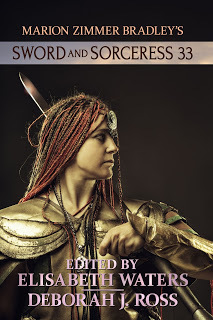 Enter a wondrous universe…the latest volume of Sword and Sorceress, featuring stories from new and seasoned authors. Herein you will find tales of fantasy with strong female characters, with some version of either martial skill or magic. Not all the protagonists will be human, and sometimes the magic will take highly original forms, but the emotional satisfaction in each story and in the anthology as a whole, remains true to the original vision. The release date will be November 2, 2018.
Enter a wondrous universe…the latest volume of Sword and Sorceress, featuring stories from new and seasoned authors. Herein you will find tales of fantasy with strong female characters, with some version of either martial skill or magic. Not all the protagonists will be human, and sometimes the magic will take highly original forms, but the emotional satisfaction in each story and in the anthology as a whole, remains true to the original vision. The release date will be November 2, 2018. ePub: https://www.books2read.com/u/b62gG6Kindle: https://amzn.to/2NitlHH
Deborah J. Ross: Tell us a little about yourself. How did you come to be a writer?Pauline J. Alama: I had great teachers. My second-grade teacher, Mrs. Dorothy Mutch, assigned a lot of creative writing, which led me to the life-changing discovery that writing stories was like playing pretend, except better, because I got to keep my pretend game, show it to other people, sometimes even see it light them up the way it lit me up to create it. What could be better than that?
DJR: What inspired your story in Sword and Sorceress 33?PJA: I love the ocean, so I decided that was where my sword-and-sorcery buddies Ursula and Isabeau should go next. I think I also had in mind a poem by James Joyce that I sort of vaguely remembered, “I Hear an Army,” with images of riders coming up out of the sea. Now I look back at the poem and I think I may have misunderstood it as well as misremembering it, but that’s all right: I gathered what I needed from it, like a bee from a flower. Sometimes only half-remembering a source is best for creativity. The landscape of the story is partly Rhode Island, where I spent some time musing over different forms of seaweed, and partly Normandy, where I visited Arromanches, one of the D-Day beaches, walking barefoot in the sand beside my history teacher husband, listening to him talk about a very different sort of army coming out of the sea.
DJR: What authors have most influenced your writing? What about them do you find inspiring? PJA: The adventures of Ursula and Isabeau, damsels-errant in a fantasy-medieval landscape, owe a great deal to the medieval and Renaissance romances I studied in graduate school, especially the twelfth-century Arthurian romances of Chretien de Troyes, the lais of Marie de France, and the Italian Renaissance romance Orlando Furioso by Ariosto. I love the wild adventures, the weird and beautiful imagery, and the sense that as a modern reader, I’m always a traveler in a strange land when I enter these stories. And the humor, too; humor doesn’t always translate well from a medieval text to a modern reader, but it’s hard not to laugh at Perceval riding his horse into Arthur’s court, or two of Ariosto’s knights romantically fighting each other over a woman who they don’t notice has ridden away from both of them at the first opportunity. In more recent—or less ancient—literature, I am especially indebted to a couple of children’s writers: Lloyd Alexander, who introduced me not only to the joys of fantasy, but of heroic language; and Diana Wynne Jones, whose wonderfully imaginative and nuanced stories I discovered as an adult.
DJR: Why do you write what you do, and how does your work differ from others in your genre?PJA: I’m fascinated by heroes. I can’t understand why so many people find villains more interesting. Villainy is easy. Goodness is complicated. To be a hero is to dance on a knife-edge, balancing all the competing claims of everything you’re committed to protecting.
DR: How does your writing process work?PJA: For my writing process to work, I have to slay the dragon of self-doubt that always stands ready to eat my heart—or at least put it to sleep long enough to let a story escape its teeth.
DJR: What have you written recently? What lies ahead?PJA: Right now I’m working on a story about Sir Galahad and the Grail.DJR: What advice would you give an aspiring writer?PJA: Don’t read advice to writers. Read authors you admire and let their methods seep into your bones. When your bones start to sing, you’re ready to take pen in hand.
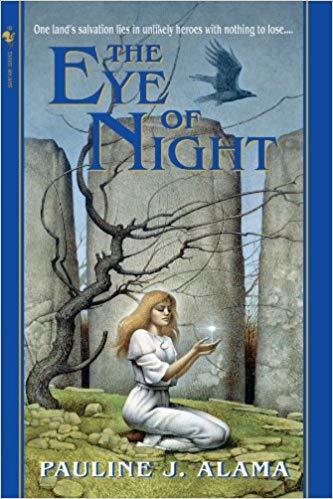
Pauline J. Alama doesn't only write stories about the ocean, but no reader of her novel The Eye of Night (Bantam Spectra 2002) can be surprised to find her returning to the theme. Her heroic duo of damsels-errant, warrior Ursula and enchantress Isabeau, have appeared in four other volumes of Sword and Sorceress. The events of "Wrestling the Ocean" occur between "Unicorn Heart" (Sword and Sorceress 31) and "Women's Work" (Sword and Sorceress 32). Pauline’s work has also been published in Abyss and Apex, Fantasy Scroll Magazine, and numerous anthologies.

Published on October 29, 2018 01:00
October 28, 2018
CITADELS OF DARKOVER Table of Contents
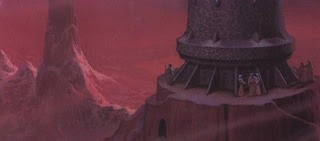
I've completed the lineup for the next Darkover anthology, Citadels of Darkover, and here it is, a banquet of delicious stories featuring fortresses of the heart as well as those constructed of stone. Release date is next May, but I'll be posting author interviews and the cover reveal as we go along.
DANCING LESSONSBy Evey BrettSACRIFICEBy Steven HarperBANSHEE CRYBy Marella SandsTHE KATANA MATRIXBy Lillian CsernicaSIEGEBy Diana L. PaxsonSEA-CASTLEBy Leslie FishFIRE STORMBy Jane M. H. BigelowTHE DRAGON HUNTERBy Robin RowlandFISH NOR FOWLBy Rebecca FoxDARK AS DAWNBy Robin Wayne BaileyCITADEL OF FEARBy Barb CaffreyTHE JUDGMENT OF WIDOWSBy Shariann Lewitt

Published on October 28, 2018 15:26
October 26, 2018
Guest Blog: Tara Gilboy on Why Adults Should Read Middle Grade Novels
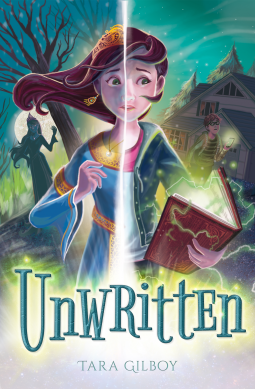 Please welcome Tara Gilboy, a Middle Grade author whose novel, Unwritten, was released on October 16*. My review of it is here. Stay tuned for her upcoming blog post on writing for Middle Grades, too!
Please welcome Tara Gilboy, a Middle Grade author whose novel, Unwritten, was released on October 16*. My review of it is here. Stay tuned for her upcoming blog post on writing for Middle Grades, too!Why Adults Should Read Middle Grade Novels, by Tara Gilboy
I don’t read adult books.
Most people give me strange looks when I say this. I’m an author, after all. And a grown up. Why wouldn’t I want to read adult books?
I think my friends and family assume it’s a phase. They are always trying to give me books after they’ve finished them. This one will convince you to read adult books again. Nope.
Now don’t get me wrong: there are many adult books I like. I have a few favorites, and from time to time, I will reread them. I love Jane Austen, Stephen King, and Amy Tan. Elizabeth Kostova’s The Historian is a favorite, as is Anthony Doerr’s All the Light We Cannot See. It’s not that I think there is anything wrong with adult books. It’s just that I like middle grade books better.
As I sat down to write this blog post, I realized I’d never really considered closely why I prefer middle grade over adult novels. Whenever anyone asked me, I’d always given the easy answer: “well, it’s because I write them.” (Which seems like the very responsible, professional, “adult” answer.) Or even worse: “ I don’t know. I just like them better.”
But middle grade books are important. For children, yes. But for adults too.
There’s been a lot of crossover in the young adult genre in recent years. Adult readers devour YA books like The Hunger Games, but the same sort of crossover is not seen as often in middle grade. Grown-ups who wouldn’t think twice about purchasing books like Divergent or Children of Blood and Bone are less eager to pick up books like Holes and Ella Enchanted.
I think there is a myth that because middle grade is shorter and written for younger readers, it must be simple or unsophisticated, but nothing could be further from the truth. Rather than making it simple, middle grade’s brevity simply means it is concise, distilled down to its most essential elements with everything extraneous stripped away. Most middle grade books are short enough to be read in one sitting, allowing you to hold the entire story in your mind in a single afternoon.
Middle grade is unpretentious, but not unsophisticated. This is its charm.
Middle grade is all about storytelling. Writing middle grade forces the author to disappear, to remove his or her ego from the writing. Readers don’t want paragraph after paragraph of all the wonderful historical research you did. They don’t care if you can write fancy poetic sentences that are grammatically correct even at a mile long. They don’t want pages of beautifully written exposition. There is a reason that middle grade books are so beloved, the books that often turn many children into lifelong readers. It’s called the “golden age of reading” for a reason. Middle grade draws on traditional storytelling forms. Heroes and quests. Magic. Evil villains.
They can be highly literary but in a way in which the language does not draw attention to itself.
Middle grade readers are old enough to be able to explore complicated and difficult issues but are still young enough and unjaded enough that they do so in a hopeful way. Middle grade answers universal questions like: “Who am I?” “What is my place in the world?” It explores questions like friendship and where we fit within our family structure. (And if exploring these themes were unique to middle grade readers, a lot fewer people would be in therapy.)
Middle grade is pure story, unobstructed by ego or long asides. The focus is on plot and character.
There are few characters more complex than Cecile in Rita Williams Garcia’s One Crazy Summer, a flawed character and negligent mother, but one whose motivations we understand entirely.
Or Anna, in Sarah, Plain and Tall, who sums up her complicated feelings about her younger brother with the simple words “Mama died the next morning. That was the worst thing about Caleb.”
I often think children have much more sense than adults, who come with so much baggage. They cut right to the heart of the matter.
My favorite thing about middle grade, though, is the point of view. I often grow frustrated with adult books. Adults are often jaded. Pessimistic. Disillusioned. One of the reasons I feel so good after I finish a middle grade novel is because I have spent a significant amount of time in the mind of a child narrator. Middle grade narrators are hopeful. They are curious. They care passionately about things. Their characters are not settled—they are still finding their own identities. They are curious and have an infinite capacity for wonder. To spend an afternoon lost in a middle grade novel is an afternoon spent reconnecting to these qualities within ourselves. These characters are not distracted, like adult narrators, by work, romance, sex, and the dull minutiae of life. There are parts of ourselves we lose as adults – hope, wonder, creativity, playfulness, even the importance of friendship – and middle grade novels present an opportunity for us to reconnect with these parts of our childhood selves and reexamine our own identities.
When we are the age of middle grade readers, anything is possible, the future unknown. We don’t know what profession we will have, who we will marry, or where we will live. That part is still unwritten.
Let us all be open to the adventure.
Middle Grade author Tara Gilboy holds a Master of Fine Arts in Creative Writing from the University of British Columbia, where she specialized in writing for children and young adults. She teaches creative writing in San Diego Community College's Continuing Education Program and for the PEN Writers in Prisons Program.
*You can order signed copies through Mysterious Galaxy: https://www.mystgalaxy.com/book/9781631631771Otherwise, it's also available at Amazon https://www.amazon.com/Unwritten-Tara-Gilboy/dp/1631631772
and Barnes and Noble: https://www.barnesandnoble.com/w/unwritten-tara-gilboy/1128015977

Published on October 26, 2018 01:00
October 24, 2018
Today's Moment of Art
Published on October 24, 2018 01:00
October 23, 2018
Herpes, PTSD, Organ Transplant Rejection, and Stars: Short Science Articles
How to make organ transplants last: New approaches try to train the body to welcome the replacement partsA discussion of various strategies to prevent rejection in transplanted organs:
Because transplanted skin has a high likelihood of provoking an immune attack, researchers were skeptical that faces or extremities could be transplanted, Cameron says. But people who have gotten face and hand transplants have needed surprisingly few drugs to minimize rejection. A recipient gets a bit of a donor’s immune system, in the form of blood-producing bone marrow stem cells within the donor’s jaw, hand or arm bones.
No one knows which, if any, of these approaches will free transplant recipients to live without fear of rejection. None of the techniques has been vetted enough yet, and none has worked for everyone, Luo points out. Each patient may need a different strategy or a combination of rejection-soothing therapies. Researchers need to push ahead on all fronts and not be afraid to explore other strategies, she says: At this stage of research, “we just cannot be … fixated on one idea.”
The Cat's Eye Nebula
Cat's Eye Nebula (NGC 6543) is one of the best known planetary nebulae in the sky. Planetary nebulae have long been appreciated as a final phase in the life of a sun-like star. But only more recently have some planetaries been found to have halos like this one, likely formed of material shrugged off during earlier active episodes in the star's evolution. While the planetary nebula phase is thought to last for around 10,000 years, astronomers estimate the outer filamentary portions of this halo to be 50,000 to 90,000 years old.
Good spatial memory? You're likely to be good at identifying smells tooThe study builds on a recent theory that the main reason that a sense of smell evolved was to aid in navigation, since most animals rely primarily on smell to find food and avoid predators. The McGill research team hypothesized that if this were indeed the case, there would be a strong link between navigation and olfaction. The researchers were able to show, for the first time, that similar regions of the brain (the hippocampus and the medial orbitofrontal cortex) are involved in these seemingly very different activities. They also discovered that the medial orbitofrontal cortex (mOFC), which is known to be involved in olfaction, is also critical to spatial memory.
Does herpes cause Alzheimer's?
What causes Alzheimer's disease? The answer could be right under our noses, says leading expert Professor Ruth Itzhaki. Her latest paper presents a lifetime of research evidence that the herpes virus responsible for cold sores can also cause Alzheimer's -- and new data which show antiviral drugs drastically reduce risk of senile dementia in patients with severe herpes infections. The review in Frontiers in Ageing Neuroscience raises the tantalizing prospect of a simple, effective preventive treatment for one of humanity's costliest disorders.
PTSD symptoms improve when patient chooses form of treatment
A multiyear clinical trial comparing medication and mental health counseling in the treatment of post-traumatic stress disorder shows that patients who chose their form of treatment -- whether drugs or therapy -- improved more than those who were simply prescribed one or the other regardless of the patient's preference.

Because transplanted skin has a high likelihood of provoking an immune attack, researchers were skeptical that faces or extremities could be transplanted, Cameron says. But people who have gotten face and hand transplants have needed surprisingly few drugs to minimize rejection. A recipient gets a bit of a donor’s immune system, in the form of blood-producing bone marrow stem cells within the donor’s jaw, hand or arm bones.
No one knows which, if any, of these approaches will free transplant recipients to live without fear of rejection. None of the techniques has been vetted enough yet, and none has worked for everyone, Luo points out. Each patient may need a different strategy or a combination of rejection-soothing therapies. Researchers need to push ahead on all fronts and not be afraid to explore other strategies, she says: At this stage of research, “we just cannot be … fixated on one idea.”
The Cat's Eye Nebula

Cat's Eye Nebula (NGC 6543) is one of the best known planetary nebulae in the sky. Planetary nebulae have long been appreciated as a final phase in the life of a sun-like star. But only more recently have some planetaries been found to have halos like this one, likely formed of material shrugged off during earlier active episodes in the star's evolution. While the planetary nebula phase is thought to last for around 10,000 years, astronomers estimate the outer filamentary portions of this halo to be 50,000 to 90,000 years old.
Good spatial memory? You're likely to be good at identifying smells tooThe study builds on a recent theory that the main reason that a sense of smell evolved was to aid in navigation, since most animals rely primarily on smell to find food and avoid predators. The McGill research team hypothesized that if this were indeed the case, there would be a strong link between navigation and olfaction. The researchers were able to show, for the first time, that similar regions of the brain (the hippocampus and the medial orbitofrontal cortex) are involved in these seemingly very different activities. They also discovered that the medial orbitofrontal cortex (mOFC), which is known to be involved in olfaction, is also critical to spatial memory.
Does herpes cause Alzheimer's?
What causes Alzheimer's disease? The answer could be right under our noses, says leading expert Professor Ruth Itzhaki. Her latest paper presents a lifetime of research evidence that the herpes virus responsible for cold sores can also cause Alzheimer's -- and new data which show antiviral drugs drastically reduce risk of senile dementia in patients with severe herpes infections. The review in Frontiers in Ageing Neuroscience raises the tantalizing prospect of a simple, effective preventive treatment for one of humanity's costliest disorders.
PTSD symptoms improve when patient chooses form of treatment
A multiyear clinical trial comparing medication and mental health counseling in the treatment of post-traumatic stress disorder shows that patients who chose their form of treatment -- whether drugs or therapy -- improved more than those who were simply prescribed one or the other regardless of the patient's preference.

Published on October 23, 2018 01:00
October 22, 2018
Sword and Sorceress 33 Author Interviews: Margaret L. Carter
 Enter a wondrous universe…the latest volume of Sword and Sorceress, featuring stories from new and seasoned authors. Herein you will find tales of fantasy with strong female characters, with some version of either martial skill or magic. Not all the protagonists will be human, and sometimes the magic will take highly original forms, but the emotional satisfaction in each story and in the anthology as a whole, remains true to the original vision. The release date will be November 2, 2018. ePub: https://www.books2read.com/u/b62gG6
Enter a wondrous universe…the latest volume of Sword and Sorceress, featuring stories from new and seasoned authors. Herein you will find tales of fantasy with strong female characters, with some version of either martial skill or magic. Not all the protagonists will be human, and sometimes the magic will take highly original forms, but the emotional satisfaction in each story and in the anthology as a whole, remains true to the original vision. The release date will be November 2, 2018. ePub: https://www.books2read.com/u/b62gG6Kindle: https://amzn.to/2NitlHH
Deborah J. Ross: Tell us a little about yourself. How did you come to be a writer?Margaret L. Carter: Reading Dracula at the age of twelve lured me into classic horror, then fantasy and “soft” science fiction. Especially in the horror genre, I read everything I could find, mainly in the public library, because I didn’t have much money for books at that age. I started writing to get more of the kinds of stories I wanted to read. I particularly wanted fiction sympathetic to or from the viewpoint of the “monster.” Those stories were hard to find in the 1960s, so I created my own. My first publications, in my early twenties, were a pair of horror anthologies I edited, Curse of the Undead and Demon Lovers and Strange Seductions(which go to show how much easier it was to break into mass market paperback at that time than it is now). Soon afterward, I wrote a book on vampirism in literature, which was released by an obscure small press, the first non-subsidy publisher I could find to accept it, not a good experience overall. My first professional fiction sale was a story in a Marion Zimmer Bradley anthology, Free Amazons of Darkover!
DJR: What inspired your story in Sword and Sorceress 33?MLC: Having started my career as an aspiring horror writer, I’ve always enjoyed a well-done ghost story, and I didn’t remember having seen many ghost stories in the Sword and Sorceress anthologies. I wanted to write something with a light, humorous tone, though, not truly scary. Since I love libraries and books, the library of a magical university immediately struck me as an appropriate setting. And having spent many years in graduate school myself, I found it plausible to create a character so absorbed in research that she could lose track of more than just time.
DJR: How does your writing process work?MLC: I outline extensively, because the first-draft process is slow and difficult for me. Without having the work planned in advance, I would get bogged down in the middle and probably quit in discouragement. Even for a short story, I at least jot down a one- or two-sentence summary of each scene before writing.
DJR: What have you written recently? What lies ahead?MLC: Writers Exchange E-Publishing is in the process of re-releasing many of my previously published fantasy, horror, and paranormal romance novels, including the four-book “Wild Sorceress” series coauthored with my husband, and, more recently, a vampire romance, Passion in the Blood. I’ve sold Yokai Magic, a new light paranormal romance novella inspired by Japanese folklore, to the Wild Rose Press. A humorous story, “Therapy for a Vampire,” is forthcoming in the small press zine Night to Dawn.
DJR: What advice would you give an aspiring writer?MLC: Read a lot, both within and outside your chosen genre. Write on a regular basis (although specific recommendations such as “write every day” or “produce a fixed number of words per day” should be adjusted to the habits and needs of each individual). Also, I’d endorse one of Robert Heinlein’s classic “rules”: Finish what you write. (Some excellent writers don’t reached that point even after years of work on a single project.) Seek the help of a critique partner or writers’ group. Never give up.Margaret L. Carter and her husband, a retired naval officer, live in Maryland and have four sons, several grandchildren and great-grandchildren, a St. Bernard, and two cats. Please visit her website, Carter's Crypt: http://www.margaretlcarter.com.
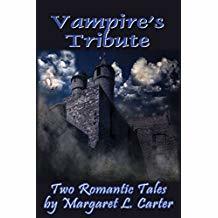 Reading Draculaat the age of twelve ignited Margaret L. Carter's interest in a wide range of speculative fiction and inspired her to become a writer. Vampires, however, have always remained close to her heart. Her work on vampirism in literature includes Dracula: The Vampire and the Critics, The Vampire in Literature: A Critical Bibliography, and Different Blood: The Vampire As Alien. She holds a PhD in English, and her dissertation contained a chapter on Dracula. In fiction, she has written horror, fantasy, and paranormal romance. Recent publications include Crimson Dreams(vampire romance), Demon’s Fall(paranormal romance novella), Heart’s Desires and Dark Embraces(story collection, fantasy and paranormal romance), and Legacy of Magic (sword and sorcery, in collaboration with her husband, Leslie Roy Carter). A humorous paranormal romance novella, "Yokai Magic," drawing upon Japanese folklore, is forthcoming. Margaret has had stories in previous Sword and Sorceress and Darkover anthologies.She and her husband, a retired naval officer, live in Maryland and have four sons, several grandchildren and great-grandchildren, a St. Bernard, and two cats. Please visit her website, Carter's Crypt: http://www.margaretlcarter.com.
Reading Draculaat the age of twelve ignited Margaret L. Carter's interest in a wide range of speculative fiction and inspired her to become a writer. Vampires, however, have always remained close to her heart. Her work on vampirism in literature includes Dracula: The Vampire and the Critics, The Vampire in Literature: A Critical Bibliography, and Different Blood: The Vampire As Alien. She holds a PhD in English, and her dissertation contained a chapter on Dracula. In fiction, she has written horror, fantasy, and paranormal romance. Recent publications include Crimson Dreams(vampire romance), Demon’s Fall(paranormal romance novella), Heart’s Desires and Dark Embraces(story collection, fantasy and paranormal romance), and Legacy of Magic (sword and sorcery, in collaboration with her husband, Leslie Roy Carter). A humorous paranormal romance novella, "Yokai Magic," drawing upon Japanese folklore, is forthcoming. Margaret has had stories in previous Sword and Sorceress and Darkover anthologies.She and her husband, a retired naval officer, live in Maryland and have four sons, several grandchildren and great-grandchildren, a St. Bernard, and two cats. Please visit her website, Carter's Crypt: http://www.margaretlcarter.com.
Published on October 22, 2018 01:00
October 19, 2018
No Book Review Today, So Here Are Some Stars...
Globular star clusters are collections of stars arranged in a roughly spherical shape because they're so tightly bound by gravity. They're some of the oldest astronomical objects known.

The dense globular cluster M15 is one of about 170 globular star clusters that still roam the halo of the Milky Way and is about 13 billion years old. Hubble-based measurements of the increasing velocities of M15's central stars are evidence that a massive black hole resides at the center of dense globular cluster M15.
Image Credit & Copyright: Bernhard Hubl (CEDIC)

Published on October 19, 2018 12:05
October 17, 2018
Today's Moment of Art
Published on October 17, 2018 01:00
October 16, 2018
Auntie Deborah on Fanfic and Creativity
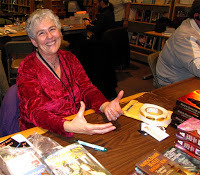 A young writer asks, "Will writing fanfic ruin my creativity? Is it a good place to start my writing career?"
A young writer asks, "Will writing fanfic ruin my creativity? Is it a good place to start my writing career?"Auntie Deborah answers:
Your question reminds me of a panel I was on some years ago, all of us pro writers with significant trad pub cred, and all of us appreciating the role of fanfic (both the fanfic we wrote, read, and was about our own work). I think fanfic is neither here nor there in terms of being a career path on its own. I would never instruct an aspiring writer to write fanfic instead of original work. At the same time, I would never tell a young writer to not write fanfic if that is what they really want to do. (Just don’t try to sell it or you will run afoul of the copyright holder’s attorneys!)
At its best, fanfic is the equivalent a love letter to the creators of the world and characters. It arises from the joy you feel in that particular world. But more than that, it’s a way to begin writing, to get in touch with that inner wellspring of words and scenes and characters. The important thing is to write and write and write until you find your own stories. That may mean following the fanfic plot lines as they morph into something quite different from the original (be sure to file all the serial numbers off) or setting aside fanfic in favor of something that’s original from the onset.
As for ruining creativity, I think that’s nonsense. No one really understands what that is, anyway. Most stories are riffs on others, perhaps dreams based on childhood bedtime stories, bits of visual imagery, ways other works have stayed with us and become mushed up in different combinations in our minds. I think the most important way to cultivate creativity is to let your imagination follow what delights you. Follow your passion, as Joseph Campbell advised. If that’s into the world of Star Trek or Harry Potter or The Lord of the Rings, just notice what parts are the most wonderful to you. Pay attention to what’s the coolest thing that might happen next — that’s where your creativity will be most nourished and where you will discover your authentic voice.
Thanks to Nina Kiriki Hoffman for the photo.

Published on October 16, 2018 01:00
October 15, 2018
Sword and Sorceress 33 Author Interviews: Evey Brett
 Enter a wondrous universe…the latest volume of Sword and Sorceress featuring stories from new and seasoned authors. Herein you will find tales of fantasy with strong female characters, with some version of either martial skill or magic. Not all the protagonists will be human, and sometimes the magic will take highly original forms, but the emotional satisfaction in each story and in the anthology as a whole, remains true to the original vision. The release date will be November 2, 2018. ePub: https://www.books2read.com/u/b62gG6Kindle: https://amzn.to/2NitlHH
Enter a wondrous universe…the latest volume of Sword and Sorceress featuring stories from new and seasoned authors. Herein you will find tales of fantasy with strong female characters, with some version of either martial skill or magic. Not all the protagonists will be human, and sometimes the magic will take highly original forms, but the emotional satisfaction in each story and in the anthology as a whole, remains true to the original vision. The release date will be November 2, 2018. ePub: https://www.books2read.com/u/b62gG6Kindle: https://amzn.to/2NitlHHDeborah J. Ross: Tell us a little about yourself. How did you come to be a writer?Evey Brett: I wrote stories when I was a kid and through high school, then I went to music school and stopped reading or writing anything that wasn’t college-related. Toward the end of my degree, I was having a hard time with music and needed a different creative outlet, so I started writing a bit of fan fiction. My first trunk novel started as a Star Trek TNG/DS9 crossover. I soon realized that would never sell, so I transposed the plot into a fantasy world and went to the library for writing books so I could learn how to write better. I took some community college classes with some very good writing teachers, and got into Clarion, and eventually started selling stories.
DJR: What inspired your story in Sword and Sorceress 33?EB: I actually wrote this story for a different editor who asked for something from me but eventually turned it down. Since then it’s been through a couple overhauls and I’m glad it found a home.
DJR: What authors have most influenced your writing? What about them do you find inspiring? EB: Mercedes Lackey comes to mind first, because toward the end of college, when I started reading again, her books happened to be the first ones I picked up—and soon enough I had a collection of all the Valdemar books. When I read the Magic’s Pawn trilogy back in 2001 or so, I finally realized what “gay” meant—and soon after I started writing, gay characters and telepaths started seeping into my work and stayed there. And,oddly enough,my own Companion, a Lipizzan mare named Carrma, showed up and picked me and she’s been a huge influence on my life and writing.
DJR: Why do you write what you do, and how does your work differ from others in your genre?EB: I don’t have any great and wonderful reason why I write what I do; it’s just what comes out, and often colored by my latest interests. Like when I first met a herd of Lipizzan horses and did horse yoga (not so much poses as an energetic exchange) I wrote a couple books involving Lipizzans and energy manipulation.
How is it different? I like to think that I focus on characters and their emotions and psychology—what makes them tick and how can they overcome whatever trauma or hard times they’ve been through. I do write mostly queer characters, but I don’t make a big deal about that; they’re accepted for who they are and don’t have to figure out what it means to be queer or fight for it. They just are.
DJR: How does your writing process work?EB: It’s mostly just whatever comes to mind. I don’t write stories in order; they come in pieces. I’ll think of an interesting bit of dialog here, a scene there, and keep adding things until the story starts to develop a plot. Then I make it tighter, “glue” together the bits of unfinished scenes, and then I have a story. Sometimes they need some research, and I’ll get a pile of books from the library or go out on an adventure, though I’ve never had much patience for notes or outlining.
DJR: What have you written recently? What lies ahead?EB: I have a couple recent stories in Crossroads of Darkover and Survivor, which is from Lethe Press. At this point, it’s just writing one story at a time, mostly for anthology calls; I haven’t had much luck with standalone stories. I’m also endeavoring to refurbish and reprint my quartet of novels since the publisher closed.
DJR: What advice would you give an aspiring writer?EB: Write what feels right for you, but learn how to do it well. Read books on writing. Find a crit group, online or in person; giving feedback is just as important as getting it so you can understand what a well-written story looks like. Go to workshops if you can, or local SF/F cons to learn more. Be humble. Be kind.
 Evey Brett lives in the Arizona desert where she enjoys catching creepy-crawlies like snakes, scorpions, tarantulas and Gila monsters and is the willing servant of several cats and a Lipizzan mare who has a habit of arranging the universe. She’s attended Clarion, Taos Toolbox and the Lambda Literary Retreat for Emerging LGBT Writers and is a first reader for the Magazine of Fantasy and Science Fiction. She has numerous novels andshort stories in anthologies such as The Myriad Carnival, Daughters of Frankenstein, Masques of Darkover, Crossroads of Darkover, and elsewhere. She can be found online at eveybrett.wordpress.com.
Evey Brett lives in the Arizona desert where she enjoys catching creepy-crawlies like snakes, scorpions, tarantulas and Gila monsters and is the willing servant of several cats and a Lipizzan mare who has a habit of arranging the universe. She’s attended Clarion, Taos Toolbox and the Lambda Literary Retreat for Emerging LGBT Writers and is a first reader for the Magazine of Fantasy and Science Fiction. She has numerous novels andshort stories in anthologies such as The Myriad Carnival, Daughters of Frankenstein, Masques of Darkover, Crossroads of Darkover, and elsewhere. She can be found online at eveybrett.wordpress.com.
Published on October 15, 2018 01:00







